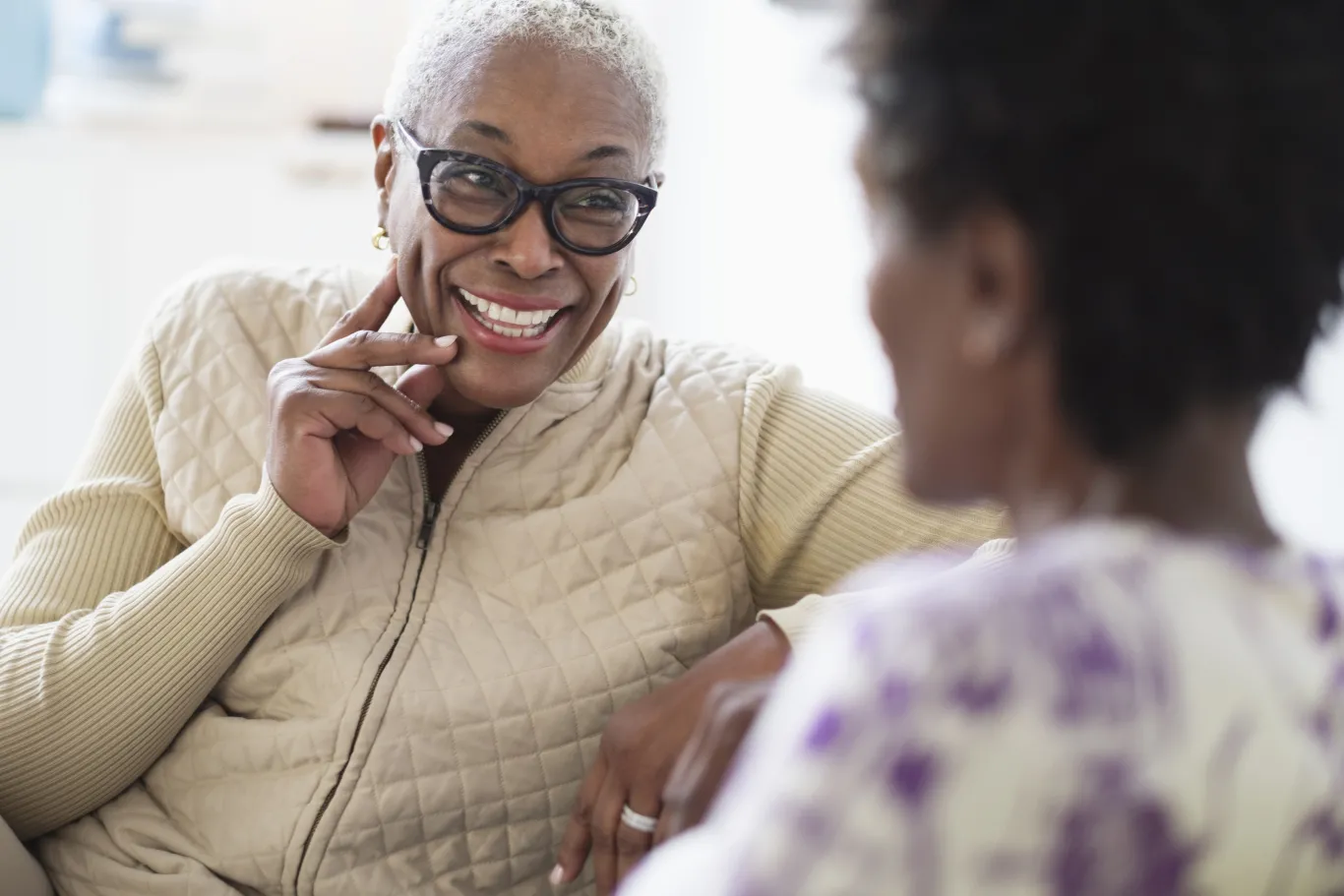CSC’s New Peer Support Program Aims to Reduce Disparities in Cancer Clinical Trials

Stock photo posed by models
If you’ve ever had trouble sleeping at night, you may have passed the time by browsing the internet. That’s what Brenda found herself doing one sleepless night when she stumbled across information on our website about our new Peer Clinical Trials Support Program. The program is a free, over-the-phone service that helps Black or African American cancer patients learn more about clinical trials by matching them with a peer — a Black or African American cancer patient or survivor who is or has already gone through a clinical trial. Peer Specialists serve as knowledgeable and empathetic guides with whom patients can discuss their fears, questions, and concerns.
The program immediately spoke to Brenda, an African American multiple myeloma survivor who participated in a clinical trial during her treatment regimen. “As I read further [about] the disparities concerning African Americans participating in cancer clinical trials, I said to myself no way can I not do something to help change this,” shares Brenda. For example, research shows that:
- Fewer than 1 in 20 adult cancer patients enroll in cancer clinical trials, and only 5% of participants are Black
- Compared to other groups, Black patients are less likely to be told about or offered a clinical trial as a treatment option
- Cancer health disparities continue, in part, because of underrepresentation of racial and ethnic minorities in medical research
Our peer support program is designed to improve cancer clinical trial enrollment among Black and African American cancer patients by increasing knowledge and awareness of clinical trials.
Keep reading to learn about Brenda’s story and why she was inspired to sign up to be a Peer Specialist in our program, which is now underway.
In this program, Peer Specialists use their own experience as a Black or African American cancer patient and clinical trial participant to support others who are interested in learning about cancer clinical trials. Could you briefly describe your cancer diagnosis, and what you valued about your experience in a cancer clinical trial?
I have a diagnosis of multiple myeloma, a plasma cell cancer. While waiting in the treatment area, I was approached by a clinical trials research team concerning my treatment modality. My regimen was Velcade and dexamethasone combination. The clinical trial monitored me while receiving the treatment at the end of every month. They helped me to complete a survey as to how my communication with my healthcare team was going. I really know now how lucky I was for this to happen to me. I was very apprehensive at first because I had no knowledge about clinical trials, but I allowed myself to participate and until this very day I am glad I did.
How did you learn about our Peer Clinical Trials Support Program, and what inspired you to sign up to become a Peer Specialist?
The Peer Clinical Trials Support Program somehow found me one sleepless night while I was browsing the internet. I became curious and looked deeper into the program. The more I read, the more excited I became. I said to myself: This is something that I can do. What a tremendous opportunity to help others and at the same time help myself. I can feel good about sharing my experiences in a helpful way.
"My hopes are that my peers will be learning and acquire an understandable approach that works for them, with my help, as they continue on their journey."
— Brenda, Peer Specialist, Peer Clinical Trials Support Program
Research shows that Black patients are less likely to be told about or offered a clinical trial as a treatment option compared to other groups. Did you face any initial barriers in your own experience? And what are some ways you feel this program can break down barriers?
Although I did not face any barriers, I now know they are there, in a big way. The Peer Clinical Trials Support Program, with dedicated and knowledgeable Peer Specialists, can help to shed light concerning the disparities as they relate to African Americans and clinical trials participation. My thoughts are we can begin by helping to dispel the myths and misinformation concerning [clinical] trials; explain to interested participants they have the right to ask any question about the trials and make them aware that there are strict guidelines concerning their safety and rights while participating; and provide support and resources whenever they need them.
Our program aims to increase knowledge and awareness of clinical trials and empower patients to ask questions and become engaged in their cancer journey. As a Peer Specialist, what do you personally hope to convey to the peers for whom you will be offering your support?
My hopes are that my peers will be learning and acquire an understandable approach that works for them, with my help, as they continue on their journey.
Are there any words of support you would like to share with cancer patients who may be considering participating in a cancer clinical trial?
The goal is to save lives, and cancer clinical trials can do that. They can be considered as the backbone of making a huge difference in your cancer treatment journey.
* * *
Cancer clinical trials are extremely important because they evaluate cancer treatments for their safety, usefulness, and impact on patients’ quality of life. If all groups are not represented in clinical trials, they will not have the chance to benefit equally from possibly life-saving treatments. The Cancer Support Community is committed to reducing disparities in cancer care through projects and initiatives like our Peer Clinical Trials Support Program.
Discover More About the Peer Clinical Trials Support Program